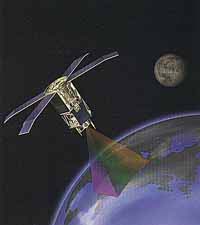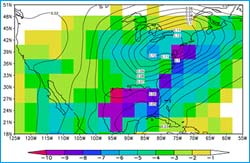Dramatic climate change as a result of global warming could happen in a single lifetime – instead of being a slow process evolving over centuries, according to a University of Ulster academic.
Professor Marshall McCabe of the School of Environmental Sciences said that given the right set of circumstances, “a climate can flip in a lifetime”. And the result could be the return of Arctic conditions last seen in the British Isles thousands of years ago.
He said that the North Atlantic

Ohio State University engineers are helping satellites form a clearer picture of water quality in the Great Lakes.
The study — the first ever to rate the effectiveness of various computer models for monitoring the Great Lakes — might also aid studies of global climate change.
As algae flourishes in the five freshwater lakes every summer, satellite images show the water changing color from blue to green, explained Carolyn Merry, professor of civil and environmental engineeri

Across the world, rivers wash mountains into the sea. In the beautiful and rugged mountains of southeast Alaska, glaciers grind mountains down as fast as the earth’s colliding tectonic plates shove them up.
“Like an ice palace cheese grater, glaciers sweep and grind rocks off of mountains. No matter how fast the plate pushes the rock up, the glacier will erode it just as fast,” said James A. Spotila of Blacksburg, assistant professor of geosciences at Virginia Tech. The National Science
Earth’s climate system is more sensitive to perturbations now than it was in the distant past, according to a study published this week in the journal Nature. The findings suggest a previously unrecognized role for tropical and subtropical regions in controlling the sensitivity of the climate to change. Christina Ravelo, an ocean scientist at the University of California, Santa Cruz (UCSC) , and her coauthors at UCSC and Boise State University, Idaho, focused on the Pliocene epoch, from
Scientists working in the stormy and inhospitable waters off the Antarctic Peninsula have found what they believe is an active and previously unknown volcano on the sea bottom. The international science team from the United States and Canada mapped and sampled the ocean floor and collected video and data that indicate a major volcano exists on the Antarctic ontinental shelf, they announced on May 5 in a dispatch from the research vessel Laurence M. Gould, which is operated by the National Sc

the last four decades, scientists have observed a 1.3% per decade decline in the amount of sun reaching the Earth’s surface. This phenomenon, coined “solar dimming” or “global dimming,” is due to changes in clouds and air pollution that are impeding the suns ability to penetrate. Scientists believe that the combination of growing quantities of man-made aerosol particles in the atmosphere and more moisture are causing the cloud cover to thicken.
Despite this decline in solar radiation, the E